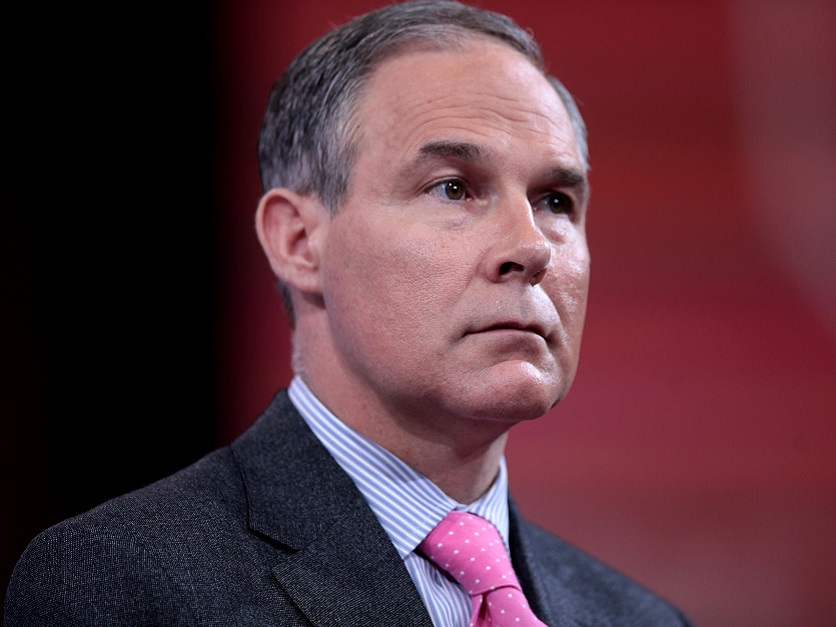WASHINGTON, June 15, 2017 - EPA Administrator Scott Pruitt committed to publishing a new rule establishing which waters would be regulated under the Clean Water Act by the first three months of next year at the latest, in testimony before House appropriators today.
Making his first appearance before the House Interior and Environment appropriations subcommittee, the agency head promised that EPA would provide a new definition by the fourth quarter of this year, but “no later than” the first quarter of next year.
The schedule seems ambitious, given that EPA – which is working with the Army Corps of Engineers on the issue – has yet to propose withdrawal of the existing WOTUS rule, now stayed by the federal courts.
Pruitt’s promise came during a hearing in which he defended a proposed cut of 31 percent to his own agency’s budget, prompting more than one subcommittee member to predict that unlike most administrators, he would surely get more than he asked for.
Pruitt received criticism from members of both parties for proposed reductions or outright elimination of grant programs seen as essential to the operation of state environmental agencies. Following the hearing, subcommittee member Chellie Pingree, D-Maine, said “the most revealing thing” to come out of the hearing was “how many members each brought up concerns. Virtually everybody had a concern about something.”
Subcommittee Chairman Ken Calvert, R-Calif., said that cuts to the Superfund program and to grants to reduce air pollution were “all proposals we are unlikely to entertain.” He also said that the budget proposes to cut state grants while EPA, at the same time, asks states “to serve as principal leads to implement delegated environmental programs.”
Rep. Marcy Kaptur, D-Ohio, said the proposed reductions in state grants would force Ohio’s EPA to cut its budget by 30 percent.
The fiscal 2018 budget proposal also proposes to zero out funding for geographic programs such as the Great Lakes Restoration Initiative (GLRI), which will receive nearly $300 million in the current fiscal year, and the Chesapeake Bay program, due to receive $72.8 million.
Kaptur and Rep. David Joyce, R-Ohio, both emphasized the importance of the GLRI to their state, with Joyce mentioning the water bodies' economic value -- such as through shipping -- as well as the fact that 300,000 people get their drinking water from Lake Erie.
“We recognize the importance of the Great Lakes,” Pruitt told Joyce. “We’re going to work with you to ensure priorities are addressed.”
When Joyce said that the budget “appears to largely remove the federal government” from Great Lakes restoration efforts, Pruitt said that there are “functions the agency can perform outside of funding.” He also characterized the Chesapeake Bay Total Maximum Daily Load (TMDL) program, which is designed to set limits on nutrients entering the bay, as a state effort.
“Obviously, money’s important,” he said, but so is EPA’s “leadership role,” adding that EPA views states as “partners and stakeholders.”
After the hearing, however, Pingree said, “I just don’t understand how it’s even vaguely possible that this (federal-state) ‘partnership’ continues when there’s no funding there for all the things we need to do.”
On other issues of significance to agriculture, Pruitt agreed, when questioned by Rep. Mike Simpson, R-Idaho, that reauthorization of the Pesticide Registration Improvement Act is important in order to ensure continued funding of reviews for existing and new pesticide registrations and other activities performed by the Office of Pesticide Programs.
PRIA reauthorization is a priority of CropLife America, Farmworker Justice and other members of a coalition that wants to see timely and science-based review of pesticide products. The House passed a reauthorization bill in March and the Senate followed with a hearing in May.
PRIA establishes fees for registration and re-registration of pesticides, food tolerances, and dozens of other actions authorized by the Federal Insecticide, Fungicide, and Rodenticide Act. The fees account for between 30 and 35 percent of the budget for EPA’s Office of Pesticide Program, according to EPA.
Pruitt also defended the agency’s decision to allow continued use of chlorpyrifos (trade name: Lorsban) despite concerns about its impacts on children’s brain development. He told ranking minority member Betty McCollum, D-Minn., that EPA based its decision to reject environmental groups' petition to ban the pesticide on "meaningful data."
Rep. Tom Cole, R-Okla., also asked Pruitt to make sure EPA reviews data from the Agricultural Health Study concluding that glyphosate does not cause non-Hodgkin lymphoma. The AHS data were reported by Reuters yesterday.
“As you do your review, could you look into that and see if that study is there and just make sure that your people, as they make their determination, have access to that data?” Cole asked.
“We will do that and report back,” Pruitt said.
#30
For more news, go to www.Agri-Pulse.com


